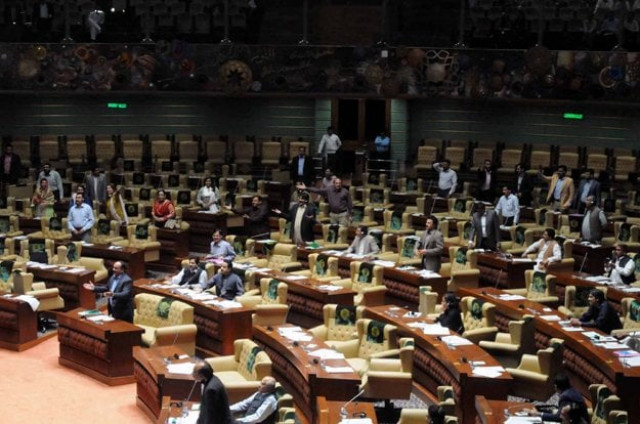PA passes Rs2.2t budget
Opposition members demand reduction in non-development expenditures

Sindh Assembly on Wednesday passed Rs2.2 trillion budget for the year 2023-24 and a Rs312 billion supplementary budget for the outgoing year 2022-23.
The budget was presented on June 10. Out of 168 MPAs around 80 talked on it in six sittings.
During the session the opposition members moved around 155 cut motions to reduce non-development expenditure of different departments, but all the motions were rejected with majority votes of treasury benches.
As the session started with Speaker Agha Siraj Durrani the chair, Chief Minister Murad Ali Shah, who also holds the portfolio of finance minister, presented the supplementary budget for the outgoing fiscal of 2022-23.
“We have spent Rs55 billion supplementary budget on rehabilitation of flood affected people, Rs55 billion wheat subsidy, Rs19 billion debt payment, Rs5.43 billion health and Rs16 billion on electricity payment,” he said. During his speech, the chief minister referred to his visit to Islamabad and meetings with Prime Minister Shahbaz Sharif and thanked him for giving more funds to Sindh for reconstruction of houses for flood victims, school buildings and K-4, a water bulk supply project.
“The federal government on the request of Bilawal Bhutto Zardari has given an extra amount Rs25 billion,” he said adding, “Rs6 billion has been given for K-4 project and Rs2 billion for the reconstruction of schools. The rest of the amount will be spent on the building of 2.1 million houses for flood victims in Sindh.”
The CM said that after the new tranche coming from the federal government the total development outlay of the provincial government has been enhanced from Rs700 billion to Rs735 billion. “At the time of presenting the budget, we had Rs37.79 billion deficit which now jumped to Rs42 billion for next fiscal year,” the chief minister said. During his speech, the chief minister appreciated the role of opposition parties for not creating fuss in the session as compared to past practices. “I am thankful to the opposition parties as this year’s budget is being passed in peaceful manners,” he said.
It may be mentioned here that there was strong opposition in the house as Leader of the Opposition and most of the opposition members who belong to Pakistan Tehreek e Insaf (PTI) have been absent from the house after May 9 incidents that took place in the aftermath of Imran Khan’s arrest.
Before the budget was passed, the MQM Rashid Khilji and Hamid Zafar moved to cut motions to reduce the non-development expenses by not purchasing the furniture for government offices and gifts that are presented by deputy commissioners to various people in their respective areas. A total 155 cut motions were tabled by opposition members, but all were rejected with majority votes of the government.
It may be mentioned here that a total revenue receipts of the provincial government were estimated at Rs2,209.785 billion, representing an increase of 31.56% over the current fiscal year 2022-2023, against estimated expenditures of Rs2,247.581 billion that shows a deficit of Rs37.796 billion.
According to the budget papers, the estimated total receipts of the province include three revenue channels - current revenue receipts estimated at Rs1,823.126 billion, current capital receipts at Rs36.133 billion, and other receipts at Rs295.53 billion.
In addition to the revenue receipts, carryover cash balance is estimated to be Rs45 billion and net balance of public accounts of the province Rs10 billion, with Rs5,585.66 billion in receipts and Rs5,575.66 billion in disbursements for fiscal year 2023-24.
The current revenue receipts include a total of Rs1,353.2 billion in federal transfers in the form of revenue assignment estimated at Rs1,225 billion, straight transfers estimated at Rs64.42 billion.
Published in The Express Tribune, June 22nd, 2023.



















COMMENTS
Comments are moderated and generally will be posted if they are on-topic and not abusive.
For more information, please see our Comments FAQ